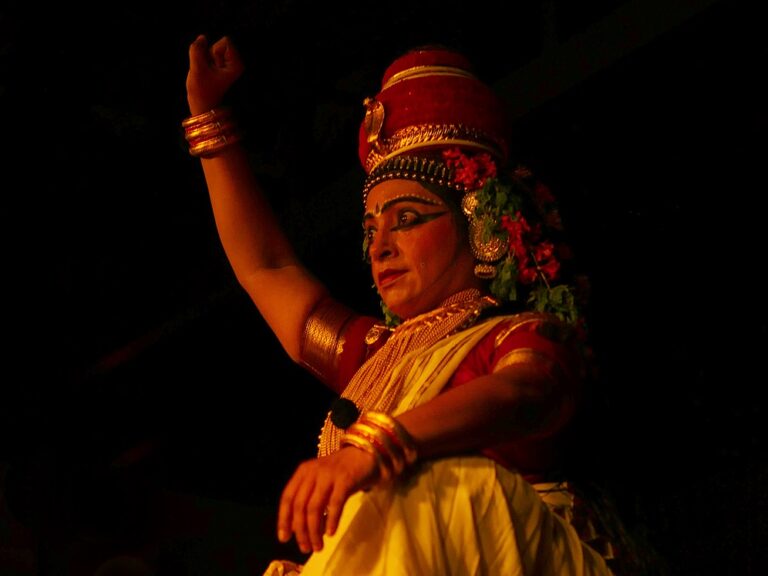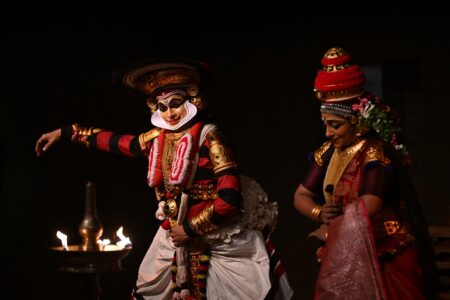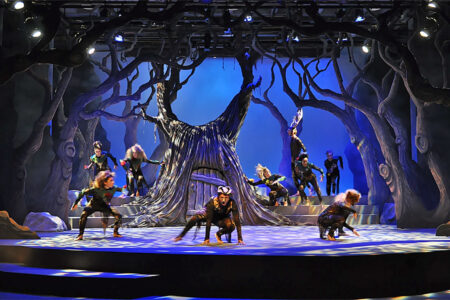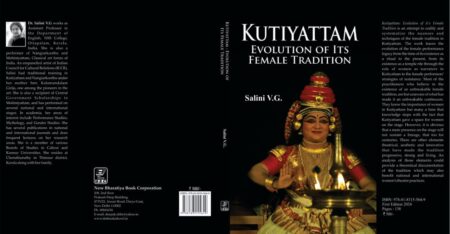Kapila Venu brings the Tamil folktale of Madurai Veeran to life for the first time through Nangiyarkoothu.
Adapting new themes into traditional art forms can be challenging. Artists must strike a delicate balance, honouring regional culture while also pushing the boundaries of the art itself. This is particularly evident in Kudiyattam, India’s oldest surviving Sanskrit theater tradition, rooted in ancient Sanskrit texts. However, Kudiyattam artist Kapila Venu is pioneering innovative approaches. In her recent performance of ‘Madurai Veeran Kathai,’ at Natanakairali, Irinjalakuda, she not only introduces a fresh story from Tamil folklore to the Nangiyarkoothu stage but also adeptly incorporates lines from the timeless wisdom text Thirukkural into the Nangiyarkoothu’s verses.
Inspired by Part Three of Thirukkural, ‘Inbathupal,’ Kapila adapted the legendary saga of Madurai Veeran, a revered figure in Tamil folklore, for Nangiyarkoothu. The tale unfolds thus: Tulasi Rajan, a South Indian king, influenced by the predictions of an astrologer, forsakes his son, fearing the child would bring him misfortune. However, fate intervenes as a mighty tree offers shelter, and a serpent becomes the child’s companion. Happily, a childless woodcutter discovers the abandoned baby and adopts him joyfully. Named Madurai Veeran by his peers, the child thrives under these circumstances, evolving into a formidable warrior skilled in martial arts.
Madurai Veeran’s renown reaches the court of chieftain Bommanna Nayakan, where he is appointed as a guard. Eventually, his fame leads him to Madurai, a city besieged by bandits, where King Thirumala Nayakar seeks his aid. In Madurai, Veeran encounters Vellaiyammal, a gifted royal dancer enchanted by his charisma and prowess.

One fateful night, disguised, Veeran approaches Vellaiyammal, only to be falsely accused of treason and condemned to amputation. Witnessing this injustice, Vellaiyammal pledges to join him in death. Through prayers to Goddess Meenakshi, Veeran’s limbs are miraculously restored. Nevertheless, he remains steadfast, convinced that his destiny is to perish for his alleged transgressions. With a heavy heart, he takes his own life, severing his head with his sword. In homage to his valour, the king erects a temple in honour of Madurai Veeran.
Excellent portrayal
In a captivating 90-minute performance, Kapila’s mastery of her craft is evident from the outset, weaving a tapestry of emotions that resonates with audiences. Through subtle expressions and evocative gestures, she guides the protagonist through his tumultuous journey, from fervent longing to heart-wrenching loss. While adhering to traditional mudras and costumes, Kapila seamlessly integrates folk rhythms and dance movements, infusing each scene with authenticity and vitality. The audience finds no barrier in the recitation of Tamil verses from Thirukkural.
Kalamandalam Rajeev and Kalamandalam Hariharan on the mizhavu, and Kalanilayam Unnikrishnan on Edakka, provided impressive percussion support.
Along with her father, Kutiyattam exponent G Venu, previously, Kapila had curated Shaivakoothu based on the poems of Karaikkal Ammiyar, in addition to adapting fragments from ancient texts such as Soundarya Lahari, Geetha Govindam, Seethaparithyagam, and Rabindranath Tagore’s ‘Chitra’ into Kudiyattam.
The performance served as a fitting tribute within the broader context of a ceremony honoring Venu, for his recent winning of the Sangeet Natak Akademi Award for the year 2023 for contribution to the performing arts and Kerala Kalamandalam Fellowship. The event was inaugurated by R Bindu, Minister for Higher Education.
Photo: Manoj Parameswaran




